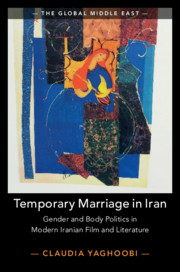Book contents
- Temporary Marriage in Iran
- The Global Middle East
- Temporary Marriage in Iran
- Copyright page
- Dedication
- Contents
- Acknowledgments
- Note on Transliteration, Dates, and Translation
- Prologue
- Part I General Overview
- Part II Representation of Sigheh/Sex Work in the Literature of the Pahlavi Era
- 2 Gendered Violence in Moshfeq-e Kazemi’s Tehran-e Makhuf
- 3 The Volatile Sigheh/Sex Workers’ Bodies in Jamalzadeh’s Ma’sumeh Shirazi
- 4 Colonized Bodies in Al-e Ahmad’s “Jashn-e Farkhondeh”
- 5 The Grotesque Sigheh/Sex Worker’s Body in Golestan’s “Safar-e ‘Esmat”
- 6 Bodily Inscriptions in Chubak’s Sang-e Sabur
- Part III The Islamic Republic and Sigheh in the Film Industry
- Bibliography
- Index
4 - Colonized Bodies in Al-e Ahmad’s “Jashn-e Farkhondeh”
from Part II - Representation of Sigheh/Sex Work in the Literature of the Pahlavi Era
Published online by Cambridge University Press: 13 January 2020
- Temporary Marriage in Iran
- The Global Middle East
- Temporary Marriage in Iran
- Copyright page
- Dedication
- Contents
- Acknowledgments
- Note on Transliteration, Dates, and Translation
- Prologue
- Part I General Overview
- Part II Representation of Sigheh/Sex Work in the Literature of the Pahlavi Era
- 2 Gendered Violence in Moshfeq-e Kazemi’s Tehran-e Makhuf
- 3 The Volatile Sigheh/Sex Workers’ Bodies in Jamalzadeh’s Ma’sumeh Shirazi
- 4 Colonized Bodies in Al-e Ahmad’s “Jashn-e Farkhondeh”
- 5 The Grotesque Sigheh/Sex Worker’s Body in Golestan’s “Safar-e ‘Esmat”
- 6 Bodily Inscriptions in Chubak’s Sang-e Sabur
- Part III The Islamic Republic and Sigheh in the Film Industry
- Bibliography
- Index
Summary
Chapter 4 analyzes Jalal Al-e Ahmad’s “Jashn-e Farkhondeh” ("The Auspicious Celebration"), set in the 1930s, drawing on the 1936 police-enforced unveiling decree of Reza Shah. The narrator’s father, a cleric, has been invited to Reza Shah’s organized event for the Emancipation of Women where he will have to take his wife unveiled. To avoid this, he decides to contract a sigheh for two hours with a friend’s more modern daughter, so he can attend without violating the royal command, but able to disobey the state’s unveiling decree by not attending it with his formal wife. Al-e Ahmad shows how female sexuality is regulated and the female body is exploited under a religious façade to the benefit of the sociocultural, religious, and political institutions during the early years of the Pahlavi regime. Al-e Ahmad addresses the issue of modernization, how it intersects with anxieties over losing or sacrificing indigenous culture, and the role of women within this new nation-state, which is heading toward a Western model of modernization. In so doing, “Jashn-e Farkhondeh” depicts how modern Iranian womanhood came to be defined through the struggle between religion and politics, as well as the interaction between modernity and tradition, among other factors.
Keywords
- Type
- Chapter
- Information
- Temporary Marriage in IranGender and Body Politics in Modern Iranian Film and Literature, pp. 134 - 155Publisher: Cambridge University PressPrint publication year: 2020



